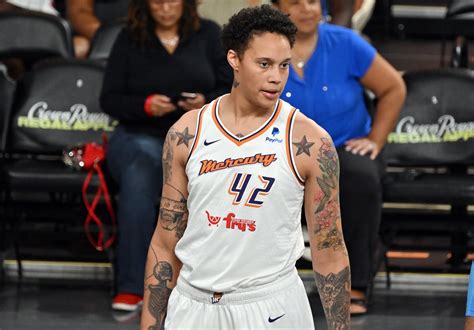
Brittney Griner has found herself at the center of controversy after alleged comments attributed to her regarding Caitlin Clark and the WNBA draft have sparked outrage among conservative commentators. The purported remarks, which haven’t been directly confirmed, suggest Griner believes Clark’s popularity is due to her race and sexual orientation, igniting a firestorm of criticism online and in the media.
The controversy began circulating after alleged quotes attributed to Griner surfaced on social media and various online platforms. These alleged quotes suggested that Caitlin Clark’s rapid rise to fame and her significant endorsement deals were primarily driven by her being a “straight, white” player, rather than solely based on her basketball skills and accomplishments. These remarks quickly drew condemnation, particularly from conservative voices who viewed them as divisive and racially charged.
While the authenticity of the alleged quotes remains unconfirmed, their impact has been substantial. High-profile conservative figures and media outlets have seized upon the situation, using it as a platform to criticize what they perceive as divisive identity politics and unfair accusations of racial bias. The incident underscores broader tensions surrounding race, gender, and sexuality in sports and the media, and the complexities of discussing these issues within the context of athletic achievement.
The unverified nature of the alleged comments has done little to quell the controversy, with many commentators focusing on the perceived implications of the remarks rather than their factual basis. The situation highlights the challenges of navigating sensitive topics in the age of social media, where unverified information can quickly spread and influence public opinion. As the debate continues, it raises important questions about the role of athletes as public figures, the responsibilities of media outlets, and the potential for misinformation to shape public discourse.
This incident unfolds against the backdrop of Clark’s groundbreaking entry into the WNBA. After a stellar college career at the University of Iowa, where she broke numerous scoring records and captivated a national audience, Clark was drafted as the number one overall pick by the Indiana Fever. Her arrival in the WNBA has generated unprecedented levels of excitement and media attention, bringing new fans to the league and sparking a surge in ticket sales and television viewership. However, her success has also led to discussions about the racial dynamics within women’s basketball, where Black players have historically dominated the sport, leading to inevitable, if complex, conversations about the reasons behind Clark’s explosive popularity.
The alleged Griner comments have added a contentious layer to these discussions. Conservatives have framed the situation as an example of unwarranted attacks on a successful white athlete, while others have defended Griner, pointing to her own experiences with discrimination and her advocacy for social justice causes. This clash of perspectives highlights the deep divisions that exist within American society regarding race, gender, and the intersection of sports and politics.
The accusations also come at a time when the WNBA is experiencing unprecedented growth and visibility. Clark’s arrival has been a major catalyst for this surge in popularity, with her games drawing record crowds and generating massive media coverage. However, the league has also faced challenges related to player salaries, marketing opportunities, and the need to address issues of diversity and inclusion. The Griner-Clark controversy underscores the complexities of navigating these issues while also trying to capitalize on the league’s newfound success.
As the controversy unfolds, it remains to be seen how it will ultimately impact the WNBA and the broader discussions surrounding race, gender, and sports. However, the incident serves as a reminder of the power of social media to shape public opinion and the importance of verifying information before drawing conclusions. It also highlights the need for nuanced and thoughtful conversations about sensitive topics, rather than resorting to divisive rhetoric and personal attacks.
Background and Context:
Brittney Griner, a prominent WNBA player for the Phoenix Mercury, has been an outspoken advocate for social justice causes throughout her career. Her activism has often focused on issues of racial inequality, LGBTQ+ rights, and criminal justice reform. She gained international attention in 2022 when she was detained in Russia on drug charges, a situation that sparked a diplomatic crisis and led to her eventual release in a prisoner exchange. Griner’s experiences have shaped her perspective on issues of privilege and discrimination, and she has often used her platform to speak out against injustice.
Caitlin Clark, on the other hand, is a rising star in women’s basketball. Her exceptional scoring ability and captivating playing style have made her a fan favorite and a media darling. Her arrival in the WNBA has been compared to that of other transformative athletes, such as LeBron James and Michael Jordan. Clark’s popularity has brought new attention and revenue to the league, but it has also raised questions about whether she is receiving preferential treatment due to her race and background.
The intersection of these two figures, Griner and Clark, has created a complex and potentially volatile situation. The alleged comments attributed to Griner have tapped into existing anxieties and tensions surrounding race, gender, and sexuality in sports. The fact that the comments are unverified has not diminished their impact, as they have been widely circulated and discussed on social media and in the media.
Conservative Outrage and Media Coverage:
The conservative reaction to the alleged Griner comments has been swift and vociferous. Many conservative commentators have accused Griner of engaging in reverse racism and of attempting to undermine Clark’s success. Some have even called for Griner to be suspended or fired from the WNBA.
Outlets such as Fox News, Breitbart, and The Daily Wire have given extensive coverage to the controversy, often framing it as an example of liberal hypocrisy and the dangers of identity politics. These outlets have highlighted the alleged comments as evidence that Griner and other progressive activists are unfairly targeting white athletes.
The conservative outrage has also been fueled by the perception that Clark is being unfairly criticized simply because of her race. Many conservatives believe that Clark’s success is solely due to her talent and hard work, and that any suggestion to the contrary is an attempt to diminish her accomplishments.
However, some conservative voices have cautioned against jumping to conclusions and have called for a more nuanced discussion of the issues involved. These commentators have acknowledged that race and gender can play a role in shaping perceptions of athletes, but they have also emphasized the importance of celebrating individual achievements.
Analysis and Implications:
The Griner-Clark controversy highlights the challenges of discussing race, gender, and sexuality in the context of sports. These issues are often highly sensitive and can easily be misinterpreted or weaponized.
One of the key challenges is the difficulty of separating legitimate criticisms from baseless accusations. In the case of Clark, it is fair to ask whether her race has played a role in her rapid rise to fame. However, it is also important to acknowledge her exceptional talent and hard work.
Similarly, it is important to recognize that Griner has a history of advocating for social justice causes and that her perspective is shaped by her own experiences with discrimination. However, it is also important to hold her accountable for her words and to ensure that she is not engaging in harmful stereotypes.
The controversy also underscores the power of social media to amplify divisive rhetoric and to spread misinformation. The fact that the alleged Griner comments are unverified has not prevented them from being widely circulated and discussed. This highlights the need for greater media literacy and critical thinking skills.
Ultimately, the Griner-Clark controversy is a reminder of the importance of engaging in respectful and nuanced conversations about sensitive topics. It is essential to avoid personal attacks and to focus on the issues at hand. It is also important to recognize that there are often multiple perspectives on complex issues and that it is possible to disagree without being disrespectful.
The Role of Athlete Activism:
The situation also brings to light the increasing role of athletes as social and political activists. In recent years, many athletes have used their platforms to speak out on issues ranging from racial injustice to gun violence to LGBTQ+ rights. This trend has been met with both praise and criticism.
Supporters of athlete activism argue that athletes have a responsibility to use their influence to promote positive change. They point out that athletes are often role models for young people and that their voices can be particularly powerful.
Critics of athlete activism argue that athletes should stick to sports and avoid getting involved in politics. They argue that athletes are not experts on complex issues and that their opinions should not be given undue weight.
The Griner-Clark controversy illustrates the challenges of athlete activism. When athletes speak out on controversial issues, they are often subjected to intense scrutiny and criticism. They may also face backlash from fans, sponsors, and even their own teams.
Despite these challenges, many athletes continue to use their platforms to advocate for social justice causes. They believe that it is their responsibility to speak out against injustice and to promote a more equitable society.
Impact on the WNBA:
The controversy has also had an impact on the WNBA. The league has been working to increase its visibility and popularity in recent years, and Clark’s arrival has been a major boost. However, the Griner-Clark controversy has the potential to overshadow the positive momentum that the league has been building.
The WNBA has a long history of supporting social justice causes, and many of its players have been active in advocating for equality and inclusion. However, the league has also faced criticism for not doing enough to address issues of racial inequality within its own ranks.
The Griner-Clark controversy presents a challenge for the WNBA. The league must balance its commitment to social justice with its desire to avoid alienating fans and sponsors. It must also find a way to address the underlying issues of race and gender that have fueled the controversy.
One possible approach is for the WNBA to use the controversy as an opportunity to engage in a broader dialogue about race, gender, and equality. The league could host town hall meetings, create educational programs, and partner with organizations that are working to promote social justice.
Ultimately, the success of the WNBA will depend on its ability to create a welcoming and inclusive environment for all players and fans. The Griner-Clark controversy is a reminder that there is still much work to be done in this area.
Conclusion:
The Brittney Griner-Caitlin Clark controversy is a complex and multifaceted issue that highlights the challenges of discussing race, gender, and sexuality in the context of sports. The alleged comments attributed to Griner have sparked outrage among conservatives and have raised questions about the role of athlete activism and the impact of social media.
The controversy serves as a reminder of the importance of engaging in respectful and nuanced conversations about sensitive topics. It is essential to avoid personal attacks and to focus on the issues at hand. It is also important to recognize that there are often multiple perspectives on complex issues and that it is possible to disagree without being disrespectful.
As the controversy continues to unfold, it remains to be seen how it will ultimately impact the WNBA and the broader discussions surrounding race, gender, and sports. However, the incident serves as a valuable reminder of the importance of critical thinking, media literacy, and a commitment to social justice.
Frequently Asked Questions (FAQs):
Q1: What are the alleged comments attributed to Brittney Griner about Caitlin Clark?
A1: The alleged comments, which have not been officially confirmed by Griner, suggest that Caitlin Clark’s popularity and endorsement deals are primarily due to her being a “straight, white” player rather than solely based on her basketball skills. These comments imply that race and sexual orientation have played a significant role in Clark’s success.
Q2: Have the alleged comments been verified or confirmed by Brittney Griner or her representatives?
A2: No, the alleged comments have not been verified or confirmed by Brittney Griner or her representatives. The controversy stems from unverified quotes circulating on social media and various online platforms. This lack of confirmation has not prevented the widespread discussion and debate surrounding the issue.
Q3: What has been the reaction from conservative commentators and media outlets?
A3: Conservative commentators and media outlets have largely condemned the alleged comments, viewing them as divisive and racially charged. They have framed the situation as an example of unwarranted attacks on a successful white athlete and criticized what they perceive as divisive identity politics. Some have even called for Griner to face consequences for her alleged remarks.
Q4: How has Caitlin Clark’s arrival in the WNBA impacted the league, and how does this controversy relate to that?
A4: Caitlin Clark’s arrival in the WNBA has generated unprecedented levels of excitement and media attention, bringing new fans to the league and sparking a surge in ticket sales and television viewership. The controversy related to the alleged Griner comments adds a contentious layer to discussions about the racial dynamics within women’s basketball and whether Clark is receiving preferential treatment due to her race and background. It underscores existing tensions surrounding race, gender, and sexuality in sports.
Q5: What are the broader implications of this controversy for discussions about race, gender, and sports?
A5: The controversy highlights the challenges of discussing sensitive topics like race, gender, and sexuality in the context of sports. It underscores the power of social media to shape public opinion and the importance of verifying information before drawing conclusions. It also raises questions about the role of athletes as public figures, the responsibilities of media outlets, and the potential for misinformation to shape public discourse. The situation emphasizes the need for nuanced and thoughtful conversations about these issues, rather than resorting to divisive rhetoric and personal attacks.
Expanded Analysis and Additional Context
The so-called “Griner-Clark feud,” despite hinging on unverified claims, taps into several complex and highly sensitive areas within American society and the world of professional sports. Understanding the nuances requires going beyond the surface-level outrage and examining the underlying factors contributing to the fervor.
The Fragility of Online Discourse:
The origin of the controversy – unattributed quotes circulating online – is a crucial point often glossed over in the heated debates. The ease with which fabricated or misattributed statements can spread on social media presents a significant challenge to responsible journalism and informed public discourse. This incident serves as a stark reminder that information consumed online should be treated with a high degree of skepticism, especially when it involves sensitive topics and potentially inflammatory accusations. The lack of direct confirmation from Griner herself leaves room for doubt, and it is crucial to consider the possibility that the alleged quotes were fabricated or taken out of context. Even if Griner did make similar comments, the exact wording and intent could be significantly different from how they have been presented online.
Intersectionality and the Complexities of Identity:
The core of the alleged comments centers on the intersection of race, gender, and sexual orientation in shaping perceptions of athletes. While Caitlin Clark’s undeniable talent is a major factor in her success, it is impossible to ignore the potential influence of her race and sexual orientation in a sports landscape that has historically been dominated by Black athletes and where LGBTQ+ representation is still evolving.
The concept of intersectionality, coined by Kimberlé Crenshaw, emphasizes that various forms of discrimination (such as racism, sexism, and homophobia) can overlap and interact, creating unique experiences of oppression. In the context of this controversy, it is important to acknowledge that Clark’s experience as a white, heterosexual woman in basketball is different from that of Black or LGBTQ+ players. This does not diminish her accomplishments, but it does provide a more nuanced understanding of the factors that may contribute to her popularity and endorsement opportunities.
The Economic Realities of Women’s Basketball:
Another crucial aspect to consider is the economic realities of women’s basketball. The WNBA has historically struggled to attract the same level of attention and investment as its male counterpart, the NBA. Player salaries are significantly lower, and marketing opportunities are often limited. This disparity is partly due to historical biases and cultural perceptions about women’s sports.
Caitlin Clark’s arrival in the WNBA has the potential to change this dynamic. Her popularity has already led to increased ticket sales, television viewership, and endorsement deals. However, it is important to ensure that this increased attention benefits all players in the league, not just a select few. Concerns have been raised about whether Clark’s success could inadvertently widen the gap between the highest-paid players and the rest of the league, further exacerbating existing inequalities.
The Double Standards Faced by Female Athletes:
Female athletes often face a double standard compared to their male counterparts. They are often judged not only on their athletic performance but also on their appearance, personality, and personal lives. This scrutiny can be particularly intense for female athletes of color, who may face additional biases based on their race and gender.
Brittney Griner, in particular, has been subjected to intense scrutiny throughout her career, both on and off the court. Her sexuality has been a frequent topic of discussion, and she has faced criticism for her activism and outspokenness. Her detainment in Russia further amplified this scrutiny and placed her under intense public pressure. The alleged comments about Caitlin Clark may be viewed by some as a reflection of the pressures and biases that Griner herself has faced as a female athlete.
The Role of Media Narratives:
The media plays a significant role in shaping public perceptions of athletes. The way in which athletes are portrayed in the media can influence their popularity, endorsement opportunities, and overall image. It is important for media outlets to be aware of the potential biases that can influence their coverage and to strive for fairness and accuracy in their reporting.
In the case of the Griner-Clark controversy, the media has played a crucial role in amplifying the alleged comments and shaping the narrative surrounding the situation. Some media outlets have focused primarily on the outrage and controversy, while others have attempted to provide a more nuanced and balanced perspective. It is important for consumers of media to be critical of the information they are receiving and to seek out multiple sources of information to form their own informed opinions.
The Need for Nuance and Understanding:
Ultimately, the Griner-Clark controversy highlights the need for more nuanced and understanding conversations about race, gender, and sexuality in sports. It is important to acknowledge the complexities of these issues and to avoid simplistic or divisive rhetoric. It is also important to recognize that there are often multiple perspectives on complex issues and that it is possible to disagree without being disrespectful.
By engaging in thoughtful and respectful dialogue, we can create a more inclusive and equitable environment for all athletes and fans. This requires a willingness to listen to different perspectives, to challenge our own biases, and to work together to address the systemic inequalities that exist in sports and society.
Examining Potential Motivations (If the Quotes Were Accurate):
While the quotes are unconfirmed, exploring potential motivations behind such statements is crucial for a thorough analysis, hypothetically assuming their authenticity:
- Frustration with Disparities: Griner, having experienced firsthand the disparities in media coverage and endorsement opportunities for Black athletes in the WNBA, may be expressing frustration with what she perceives as an unfair advantage afforded to Clark due to her race and sexual orientation.
- Highlighting Systemic Issues: The comments could be interpreted as an attempt to draw attention to systemic issues within the WNBA and the broader sports industry, where racial and gender biases may still exist. By highlighting these issues, Griner may be seeking to advocate for greater equality and representation for all athletes.
- Personal Experiences Shaping Perspective: Griner’s own experiences with discrimination and marginalization, particularly during her detention in Russia, may have shaped her perspective and made her more sensitive to issues of privilege and inequality.
The Importance of Due Process and Respect:
Regardless of one’s opinions on the issues involved, it is crucial to emphasize the importance of due process and respect for all individuals. Brittney Griner deserves the same presumption of innocence as anyone else, and she should not be condemned based on unverified allegations. Similarly, Caitlin Clark deserves to be celebrated for her accomplishments and should not be subjected to unfair criticism or personal attacks.
The controversy serves as a reminder that we all have a responsibility to engage in respectful and constructive dialogue, even when we disagree on important issues. By approaching these conversations with empathy and a willingness to listen, we can create a more inclusive and equitable society for all.









